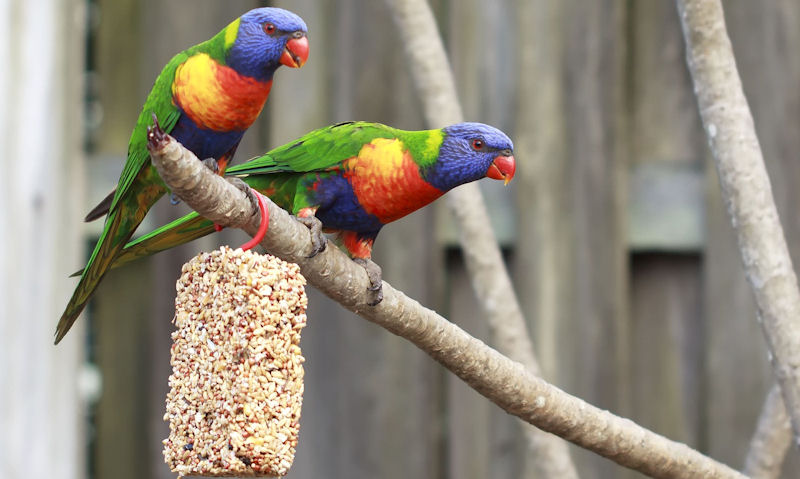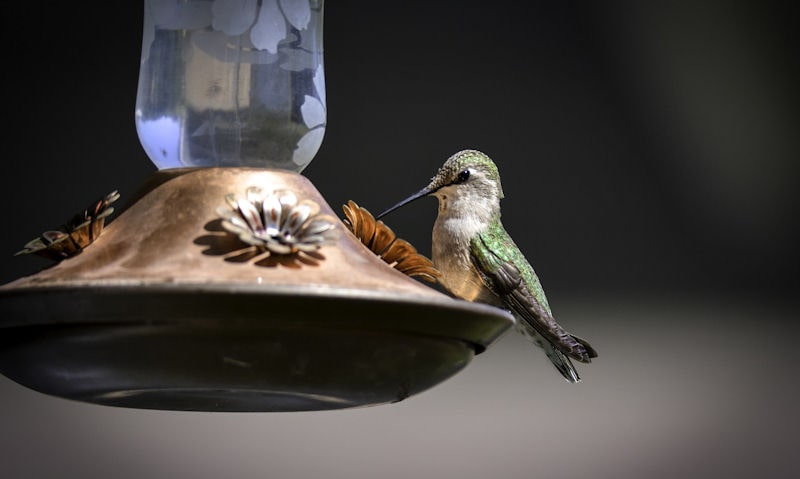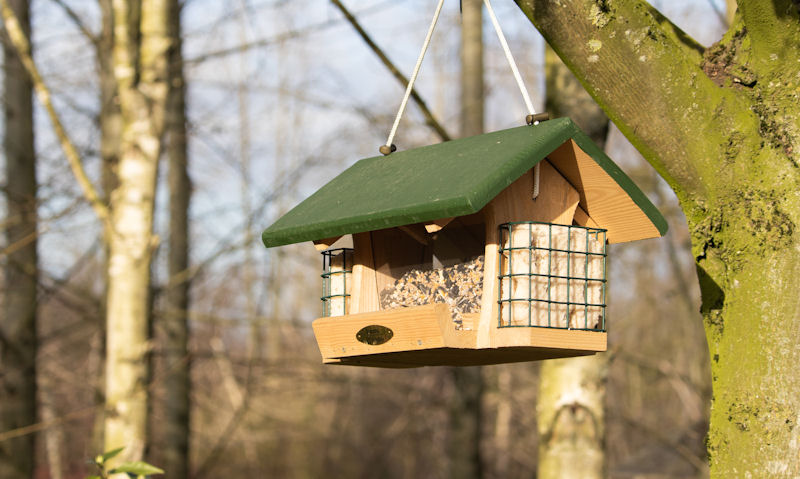Can wild birds eat Parrot food
With pet birds and even wild birds feeling like family, there will be no harm in offering Parrot food to wild birds who are fed on similar ingredients.
Wild birds can safely eat Parrot food of which will include ingredients that make up wild bird feed blends. All kinds of seeds are in there plus lots of nuts, dried fruits and vegetables, plus added vitamins. Our wild birds will simply eat what they love most, where the rest of the blend will go to waste.
What is good for pet bird food is certainly good for wild birds as well, as both parrot and wild bird food blends are primarily made with near identical ingredients.
You'll find pet bird food will feature additional, unrecognizable foods - and what looks like chemical names - yet it usually refers to added minerals to subsidize a pet bird in what they're missing out while stuck indoors.
Nutritious yet highly favorable seed mixes in parrot food can be fed to wild birds with no issues expected at all.
In fact, parrot food will provide additional ingredients which are not only safe for our wild birds, there's the possibility of attracting a wider variety of wild birds due to how much additional ingredients are added to parrot food blends.
And bear in mind, parrot food producers don't necessary use the same ingredients.
Even unique seed mixes can be added which are otherwise a treat for people - but not now they've been put in parrot food of course. Expect to find tasty big green pumpkin seeds wild birds can eat, and even hemp or flaxseeds on occasions.
With the seed mixes, you can expect to find a lot of nut mixes in parrot food which is made up of peanuts, plus a good amount of cashew nuts, pecans in certain blends, almonds, tasty pine nuts, Brazil nuts and pistachios.
All parrot food mixes are salt-free of course with perhaps added vitamins and minerals introduced via oils, which both pet birds and wild birds can eat to provide them a boost in energy.
In addition to blends of seeds and nuts added to parrot food, there's always a mix of dried fruits that is made up of Dates and raisins which are good for wild birds - plus dried vegetables in available banana, apples, chili peppers, carrots, and corn.
Pet bird food can be eaten
Like most pet bird food, you can feed budgies and even parakeets on all this kind of pet bird food, which is practically made up with the same ingredients.
What that means for you is, you can indeed safely feed what is essentially high in nutritious parrot food, that will have a blend of recognizable ingredients - including many extras you will have no idea what it is.
What ingredients you will come to recognize in wild bird food mixes - which is found in pet parrot food - are the always added sunflower seeds, which so happens to be a favorite of most wild birds in our yard.
Sunflower seeds will probably be sorted in the mix as Finches, Chickadees to Cardinals prioritize this particular seed type.
What else your wild birds will take out of parrot food blends is safflower seeds which are regularly eaten if provided in a bird feeder tray or dish.
Other types of parrot seeds mixed into the blend wild birds can eat would be canary grass seeds and of course millet.
Millet being what primarily makes up the bulk of regular wild bird seed mixes, which are fed to all seed-eating birds who will otherwise forage on seeds of grasses and weeds; and that is type of seeds we refer to as millet, including red millet.
Small quantity as usual
When feeding our wild birds a mix of parrot food out in the yard, please do so knowing much of it can be wasted.
In the best of days, the very best quality wild bird food is wasted as it isn't all eaten up in the time it takes before its time to throw out the leftovers, in order to replenish with new.
Same will apply to feeding parrot food to wild birds on what can be a dish safely located in the yard, or feed wild birds parrot food on top of a platform bird feeder that will either hang, be near to the ground, or be installed on top of a pole.
Do use a small quantity of parrot food on either one of these types of wild bird feeders, becomes I guarantee, a lot of seed mixes will go bad before they're eaten.
Wild birds like Finches, Cardinals, Blue Jays and Chickadees have their favorites, which will result in the rest being untouched.
Birds skim through bird food blends to eat what they love most, while everything else is left to rot.
Parrot food in particular has a lot of ingredients many wild bird species will prioritize, yet there's plenty more where that came from that wild birds are sure to leave well alone.
No harm in picking out favorites
I promise you, no harm can come to wild birds who feed on parrot food left outdoors for them, to help themselves to what ingredients they like most.
With that in mind, there's going to be a lot of waste as many blends feature ingredients unrecognizable to wild birds, and people as it happens.
Specs of vibrant color ingredients can be removed knowing it can be chili pepper flakes or additional supplements.
Its only natural to want to remove it but if its left in the mix it can do no damage to wild birds organs, just as it can't to pet parrots.
You'll recognize a lot of seeds in the mix of which all seeds are very good for birds, which is something you must keep in the blend - as they're both rich in vitamins and protein - and that is what wild birds must be fed on.
Go ahead and remove ingredients you feel uncomfortable with, while knowing everything added to parrot food, can be eaten by wild birds outdoors.
Added to dish or tray only
How you go about feeding wild birds on a blend of bird food intended for pet birds, is a different matter all together.
Understand though pet bird food isn't developed in the same way as wild bird food; while wild bird food is made to be left out in the elements, parrot food is made to be fed to birds indoors only.
Difference is wild bird food can last outdoors for much longer, while pet parrot food will have a much shorter shelf life.
Feed parrot food to wild birds in small quantities as mentioned above, to avoid waste.
What to put parrot food in to provide for wild birds, mustn't be any type of enclosed bird feeders - the kind that's suspended off a bird feeder pole or branch - with only a few accessible points which are going to be hard to reach for most wild birds.
Instead, you are going to want to put parrot food blends on top of a pole mounted bird feeder tray, or indeed a suspended bird feeder that is a hopper style seed feeder only.
While the pole mounted bird feeder is essentially a tray located 3-4 feet off the ground; a hopper bird feeder can be used to pop parrot food not necessary inside the feeder - but instead pile parrot food on the tray that is open to the elements.
Summary
It can be intimidating providing what is a pet bird food blend to wild birds in the yard, but it isn't, as you'll be pleased to know all wild birds can safely eat pet parrot food - and so to will common bird feeder birds eat parrot food if given the opportunity.
What is added to all types of wild bird seed mixes will be found in parrot food, which is usually made up of a lot of ingredients.
With the seeds added to parrot food that all wild birds will probably prioritize, especially seed-eating birds, nuts will be a priority next with plenty of them added to.
And with any fruit-eating wild birds, they're sure to feed on any dried fruits available.
Checking the ingredients on a parrot food box will list many unrecognizable ingredients, and some very unusual things.
Not to worry though because its usually added vitamins and minerals that pet parrots must be fed on to make up for the lack of nutrients they miss out on as pets - and not what wild parrots can naturally feed on in their native jungle.
No health issues are going to develop in wild birds who feed on parrot food, unless of course you then feed pet birds on wild bird contaminated feed.
Provide a small amount of parrot food to wild birds at a time to avoid waste, while offering parrot food out in the open to be sure all wild birds who wish to feed on it, can do on top of a platform bird feeder or dish.


